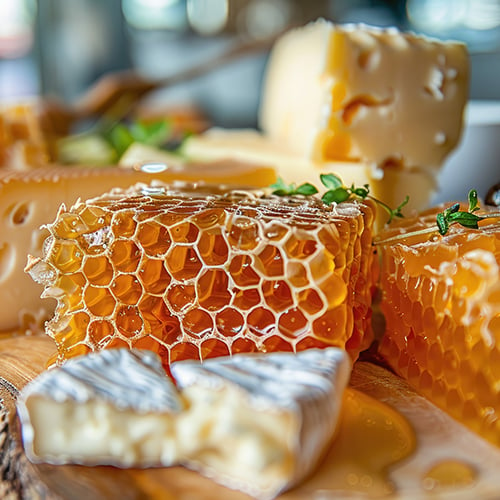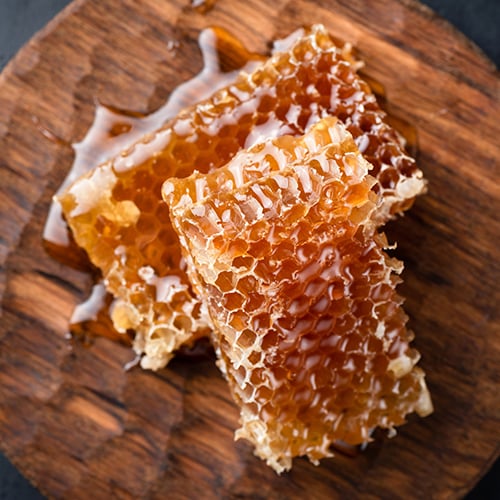Honeycomb is not only enjoyed as a standalone snack but is also utilized in various culinary applications. Chefs and foodservice professionals often incorporate honeycomb and various types of honey into cheese platters, desserts, and even savory dishes to add a touch of sweetness and visual appeal. Its natural aesthetic and rich flavor make honeycomb a versatile ingredient that can elevate the presentation and taste of a wide range of dishes.
Shop All Honeycomb ProductsCan You Eat Raw Honeycomb?
Yes, raw honeycomb is safe to eat and is considered a delicacy in many cultures around the world. The beeswax in the honeycomb is edible and provides a chewy texture, while the honey inside is packed with nutrients and health benefits.
When consuming raw honeycomb, you can either chew the wax and spit it out or swallow it. Some people enjoy spreading the honeycomb on toast, crackers, or cheese for a sweet and savory flavor combination. Others like to add chunks of honeycomb to yogurt, oatmeal, or salads for a natural sweetener.
What Does Honeycomb Taste Like?
Since the hexagonal cells of the honeycomb are filled with honey, the most prominent flavor in honeycomb is its natural sweetness. This is often described as rich and indulgent, making honeycomb a popular choice for those with a sweet tooth. In terms of texture, the waxy hexagonal cells of the honeycomb provide a satisfying crunch when bitten into, while the honey inside is smooth and viscous.
Depending on the type of flowers the bees have visited to collect nectar, honeycomb can also have subtle floral undertones. These floral notes can range from delicate and light to more robust and intense, adding depth to the overall flavor profile.
How to Use Honeycomb

When it comes to honeycomb, there are a variety of ways to incorporate this unique and flavorful ingredient into your culinary creations:
- Charcuterie and Cheese Boards - Honeycomb can be a charcuterie board essential, adding a sweet and textural element. Simply place a piece of honeycomb alongside your favorite cheeses, cured meats, and crackers for a visually appealing and delicious addition.
- Toppings - Break up small pieces of honeycomb and sprinkle them over salads for a burst of sweetness and crunch. You can also drizzle the honey from honeycombs over foods like ice cream, yogurt, and acai bowls to enhance sweetness and infuse new flavors.
- Baking - Incorporate small chunks of honeycomb into baked goods like cookies, muffins, and bread for a unique twist on traditional recipes. The honeycomb will melt slightly during baking, infusing the baked goods with a sweet and chewy texture.
- Meat Glazes - Melt honeycomb and use it as a glaze for meats such as roasted ham, chicken, or salmon. The caramelized honeycomb will create a glossy finish on the meat and add a deliciously sweet flavor.
Benefits of Eating Honeycomb
Honeycomb is not only a delicious treat but also offers a range of benefits that make it a valuable addition to commercial establishments. Packed with essential nutrients and health-promoting properties, honeycomb has been used for centuries in various culinary and medicinal applications.
- Nutrient-Rich - Honeycomb is packed with essential nutrients such as vitamins, minerals, and antioxidants. These nutrients help support overall health and well-being.
- Immune System Support - The antioxidants found in honeycomb help boost the immune system, making it easier to fight off illnesses and infections.
- Healthy Sweetener - Despite its sweet taste, honeycomb is relatively low in calories compared to other types of sweeteners. Including honeycombs in your diet in moderation may help satisfy your sweet cravings without using unhealthy sugars.
Does Honeycomb Go Bad?

When properly stored, honeycomb has an incredibly long shelf life due to its low water content and high sugar content, which create an inhospitable environment for bacteria to grow. This means that honeycomb does not spoil or expire in the traditional sense.
While honeycomb does not have a specific expiration date, it may crystallize over time. Crystallization is a natural process that occurs when the glucose in honey begins to separate from the water and form crystals. This does not mean the honeycomb is bad or unsafe to eat; in fact, many people prefer the texture and spreadability of crystallized honeycomb.
How to Store Honeycomb
Proper storage is key to maintaining the quality and freshness of honeycombs. Here are some important facts to keep in mind when storing this natural delicacy:
- Store in a Cool, Dry Place - Honeycomb should be stored in a cool, dry place away from direct sunlight and heat sources. Excessive heat can cause the honey to melt and the wax to become soft and sticky.
- Use an Airtight Container - To prevent a honeycomb from absorbing odors and moisture from the surrounding environment, store it in an airtight container. This will help maintain its flavor and texture over time.
- Check for Moisture - Before storing honeycombs, ensure they are completely dry. Any moisture present can lead to the growth of mold and spoil the honeycomb. If necessary, gently pat the honeycomb with a paper towel to remove excess moisture.
- Rotate Stock - If you have a large quantity of honeycomb, make sure to rotate your stock regularly. Use the older pieces first and replace them with fresh ones on a first in, first out basis to ensure that you always have high-quality honeycombs on hand.
Whether used as a topping for yogurt and oatmeal, incorporated into cheese boards and charcuterie platters, or enjoyed on its own as a sweet treat, honeycomb adds a unique and flavorful touch to any dish. With its natural sweetness and textural appeal, honeycomb is a popular choice for chefs and food enthusiasts looking to elevate their dishes with a touch of luxury. If you're looking to explore new and exciting flavors in your commercial kitchen, honeycomb is a strong option to consider.








